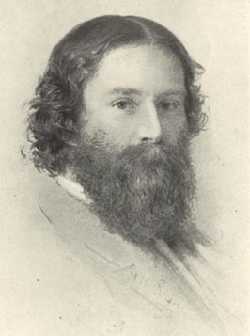 SKC Films Library SKC Films Library |
| SKC Films Library >> Linguistics, Languages, and Literatures >> American Literature >> 19th Century |
 James
Russell Lowell James
Russell Lowellpoet and essayist James Russell Lowell was born into a noted New England family in Cambridge, Massachusetts, on February 22, 1819. Introduced to poetry at an early age, he graduated as class poet from Harvard in 1838, but since he did not believe he could make a living as a writer he went on to study law. He earned his law degree in 1840 and established a practice, but soon decided that he was better suited for writing than law. Soon after giving up his law practice, Lowell began writing poetry and prose for many magazines and newspapers. His first volume of poems, A Year's Life (1841), was written after his betrothal to Maria White, whom he married in 1844. In 1843, he and his friend Robert Carter founded The Primer, a literary magazine that published works by Elizabeth Barrett Browning, Nathaniel Hawthorne, Edgar Allen Poe, John Greenleaf Whittier, Lowell, and others. Lowell developed an eye condition soon after the magazine's founding, however, and only three issues were published before financial problems forced the men to shut it down. An active member of the abolitionist movement, Lowell's second book, Conversations on some of the Old Poets (1844), was a collection of critical essays that included pleas for the abolition of slavery. From 1845 to 1850 he wrote about 50 antislavery articles for periodicals, including the National Anti-Slavery Standard, which he helped edit, and the Pennsylvania Freeman. Lowell reached the peak of his literary success in 1848, when three of his best-known poetic works were published. His sense of humor dominates A Fable for Critics, a good-natured verse satire on writers of his day, including himself. In The Biglow Papers, he used humor for social criticism. The work consists of poems and prose notes that show Lowell's opposition to the Mexican-American War. Hosea Biglow, the chief character, is an uneducated but practical-minded New England farmer who speaks in a rural New England dialect, and Lowe''s comic treatment of this dialect earned him respect among the humorists of his day. His third book of the year was, The Vision of Sir Launfal, which was based on the legendary search for the Holy Grail. At the same time Lowell was gaining fame as a poet, he was also struck by tragedy. Three of his four children died between 1847 and 1852, and Maria died in 1853. Although he never lost his natural optimism, Lowell suffered periods of despondency that continued even after his marriage to Frances Dunlap in 1857. Often too despondent to write, Lowell took teaching and editing jobs in order to maintain a stable income. In 1855, Lowell succeeded Henry Wadsworth Longfellow as professor of modern languages at Harvard; he held that position until 1872, and again from 1874 to 1876. During those periods he also held important editing positions. From 1857 to 1861, he served as the editor of Atlantic Monthly, and he served as co-editor of the North American Review from 1863 to 1872. Although he continued to write poetry, Lowell's most important works after 1860 were in prose, including essays on Dante, Shakespeare, William Wordsworth, and other authors, as well as articles on social issues, including full citizenship rights for blacks. His second series of The Biglow Papers, published in the Atlantic Monthly in 1862, reflected his anti-slavery position and support of the North during the Civil War. He also wrote two long poems, Commemoration Ode (1865) and The Cathedral (1869), and published Under the Willows and other Poems (1868), a collection of poems. After the Civil War, Lowell became active in politics. A supporter of Rutherford B. Hayes at the 1876 Republican National Convention, he declined an opportunity to run for Congress. In 1877, President Hayes rewarded Lowell's support by naming him Minister to Spain, in which capacity he served until 1880. He then served as Minister to England until 1885. During his years in Spain and England, Lowell became a popular figure in European society and a spokesman for American ideals of democracy. Upon returning to the United States in 1885, Lowell retired to the home in which he was born. He lived quietly there for the rest of his life, but he did speak at a number of public events over those years. He died on August 12, 1891, and was buried in Mount Auburn Cemetery, in Cambridge.
PRINT SOURCE WEB SOURCE SEE ALSO |
| SKC Films Library >> Linguistics,
Languages, and Literatures
>> American
Literature >> 19th Century This page was last updated on 05/27/2017. |